This House believes the pro-Israeli lobby has successfully stifled Western debate about Israel's actions
Tuesday May 01 2007
Oxford Union Society, Oxford, UK
MOTION PASSED
by 66% to 34%
Transcript
Order of speeches
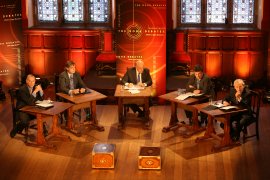
- Introduction
- Norman Finkelstein
- Martin Indyk
- Andrew Cockburn
- David Aaronovitch
- Audience questions
- Vote result
Introduction
TIM SEBASTIAN
Ladies and gentlemen, good evening to you and welcome to a very special session of the Doha Debates sponsored by the Qatar Foundation. As you can see, we've left behind our regular venue in the Gulf and we're here in Britain as guests of the Oxford Union - the most famous debating chamber in the world and the inspiration for the Doha Debates. The Union has a proud record of hosting controversial figures and discussing sensitive subjects. Malcolm X spoke here, so did Yasser Arafat and Richard Nixon. Former British Prime Minister Harold Macmillan called the Union 'the last bastion of free speech in the Western world,' and for that and many other reasons, we're delighted to be here. Our debate tonight is also concerned with free speech, especially as it relates to criticism of the state of Israel. How far do Israel's friends go in seeking to protect its reputation? Why did former US President Jimmy Carter claim it was now impossible to have a rational debate about Israel in the United States? Our motion reads 'This House believes the pro-Israel lobby has successfully stifled Western debate about Israel's actions' and we have a panel well-equipped to debate it. Speaking for the motion, Norman Finkelstein. He's a Professor of Political Science now teaching at DePaul University in Chicago. He's the son of Jewish Holocaust survivors and is well-known for writing critically about Israel. He's been at the centre of numerous heated academic and political disputes. Also for the motion - Andrew Cockburn, an Irish journalist based in the United States for many years. He's written frequently about the Middle East, and in the 1990's co-authored a book entitled 'Dangerous Liaison, The Inside Story of the US/Israeli Covert Relationship'. And against the motion, Martin Indyk, who knows the pro-Israel lobby from the inside. He's a former deputy research director for the main lobby group, The American Israeli Public Affairs Committeeor AIPAC and has served twice as US ambassador to Israel. He's now Director of the Saban Center for Middle East Policy at the Brookings Institution. And with him, David Aaronovitch, regular columnist for The Times. He's a former president of the National Union of Students and a frequent broadcaster. Ladies and gentlemen, our panel.
Norman Finkelstein
Speaking for the motion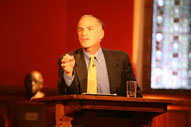
TIM SEBASTIAN
So now let me please ask Normal Finkelstein to speak for the motion.
NORMAN FINKELSTEIN
Thank you. I've devoted most of my adult life, a large part of it, to studying the Israel/Palestine conflict, and the most striking thing when you look at the actual record on the conflict - the historical record, the human rights record, the diplomatic record - the most striking thing is when you look at the actual record, how little controversy, how little dispute, how little disagreement there is among the experts and authorities, yet when you enter the arena of public debate, public discussion, the media - all of a sudden the Israel/Palestine conflict becomes so controversial. It's as if nobody agrees on anything. It's my view that the vast preponderance of this alleged controversy is fabricated, it's conjured up, it's contrived by the pro-Israel lobby in order to sow confusion, deflect attention from and stifle discussion about the actual record which is so damning of Israel. The main means used are first of all to mystify the conflict, to claim that it's so complicated that it requires a knowledge the equivalent of rocket science to penetrate its mysteries. Secondly, the dragging in of extraneous issues like the so-called new anti-Semitism, and finally the vast proliferation of misinformation, disinformation and sheer fraud which masquerades as scholarship and which is then validated and even acclaimed by the mainstream media. That's the problem.
TIM SEBASTIAN
Norman Finkelstein, thank you very much indeed. Who has ever managed to stifle you? There's a plethora of your books out there; 'The Rise and Fall of Palestine', 'The Holocaust Industry, Reflections on the Exploitation of Jewish Suffering', 'Beyond Chutzpah'. You're living proof that the debate hasn't been stifled at all, aren't you?
NORMAN FINKELSTEIN
Well, I hate to personalise these things because they have only anecdotal value, but if you want to look at the record, you say I have many books to my name. That's accurate.
TIM SEBASTIAN
And your views are out there.
NORMAN FINKELSTEIN
That's inaccurate. I have never been on television in the United States, I have never been on mainstream radio in the United States. I am now 53 years old, I have my doctoral degree from Princeton, I have a list of publications.
TIM SEBASTIAN
You're still teaching at DePaul University.
NORMAN FINKELSTEIN
As of this minute.
TIM SEBASTIAN
Oh so that's precarious, is it?
NORMAN FINKELSTEIN
I do not have a tenure job. I've been called 'the oldest living assistant professor in the United States' and that's probably true.
TIM SEBASTIAN
But you're not tucked away in some dusty room unable to speak, are you? You're listened to. You have a constituency out there.
NORMAN FINKELSTEIN
I have a constituency outside the mainstream media and abroad, but I don't think it would be accurate to say I have a constituency within the mainstream media in the United States. That would be an inaccurate statement.
TIM SEBASTIAN
And you have your critics which you would expect, wouldn't you? You don't expect to say controversial things about Israel and have them lie down and just accept it without argument, do you?
NORMAN FINKELSTEIN
No, I think criticism is a healthy phenomenon, but I don't think it's accurate to say that the criticism I articulate is heard in the mainstream media in the United States. That I would say is not a correct statement.
TIM SEBASTIAN
What about Jimmy Carter? His book, 'Palestine Peace Not Apartheid', published with great fanfare, upset a lot of people in the Jewish community. He, like you, is also living proof of the debate that you both claim isn't there. The debate is there, he's sown an enormous debate, hasn't he?
NORMAN FINKELSTEIN
Well, that's the point I'm trying to make this evening.
TIM SEBASTIAN
I thought you were trying to make the opposite.
NORMAN FINKELSTEIN
No, allow me. The fact of the matter is, I wouldn't say that Jimmy Carter's book was greeted with enthusiasm. The book was greeted with hysteria. All sorts of charges were levelled against Jimmy Carter. It was said that Jimmy Carter was in the pay of Arab sheikhs. It was said that Jimmy Carter was an anti-Semite. It was said that Jimmy Carter was a borderline Holocaust-denier. It was said that Jimmy Carter was a sympathiser of terrorism.
TIM SEBASTIAN
But when he was President, a lot of worse things were said about him.
NORMAN FINKELSTEIN
No, I don't think so.
TIM SEBASTIAN
It's a rough world, isn't it, out there?
NORMAN FINKELSTEIN
No, I don't think that's accurate. The fact of the matter is, and that was the point of my introductory remarks, if you actually read Jimmy Carter's book, it's a very tepid rendering of the actual documentary record. And the question is, why does a tepid rendering of the documentary record evoke hysteria in the United States?
TIM SEBASTIAN
Okay, Norman Finkelstein, thank you very much indeed.
Martin Indyk
Speaking against the motion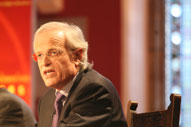
TIM SEBASTIAN
Now let me please ask Martin Indyk to speak against the motion.
MARTIN INDYK
Thank you, Tim. Good evening ladies and gentlemen. I think the fact that the Doha Debates has come to the Oxford Union, the home of debating, is an indication that there's no stifling of the debate. But let me just pick up on the Jimmy Carter example. He has written three books highly critical of Israel, the last one, 'Palestine Peace Not Apartheid', was numbe
r four on The New York Times bookseller list. By his own account, as he went on a book tour around the United States, he was greeted by thousands of people who turned out to hear his anti-Israel message. He was hosted, unlike Norman, on all the major network TV talk shows, ABC, NBC, National Public Radio, the Lehrer News Hour, Wolf Blitzer, even Larry King. He had pieces published in The Washington Post, The New York Times, The Boston Globe summarising his argument. Of course Carter managed to generate a fire-storm of criticism, not just from defenders of Israel but from people who had worked with him and considered that this particular account was biased and cavalier with the facts, but that's the best evidence that there's no stifling of the debate, on the contrary, in fact the debate has been very intense. The second case of course is the even more famous one that you'll be aware of, of Steve Walt and John Mearsheimer. These two American academics from established universities, Chicago and Harvard, wrote a very lengthy paper on the Israel lobby that was first published here by The London Review of Books. It claimed that there was a vast cabal of pro-Israel supporters who constitute a powerful machine that was distorting the American national interest in Israel's favour. Not surprisingly, it too set off a fire-storm of debate, including a symposium in the prestigious Foreign Policy magazine, an unprecedented two-day debate on national public radio, several articles in The New York Review of Books, a debate at New York's famous Cooper Union, pieces in The Washington Post and New York Times, and articles in Commentary, US News and World Report, The American Prospect, New York Sun, etc. Etc. I checked on Google tonight. There are 220,000 hits when you put Walt and Mearsheimer together. There's clearly no stifling of the debate here, but even if you don't accept all of that, Walt and Mearsheimer have just landed a book contract from Farrar Straus Giroux, the publishers of Tom Friedman's books, for $750,000 advance. That kind of lucrative response to their charges of anti-Israelism gives you a sense that perhaps there's another reason that Norman isn't on television or isn't getting such lucrative contracts even though he is published by the University of California Press. One thing that all of these people have in common, and there are many more of them who've been published in the United States, the list is endless of people who make this argument about Israel's sins and the power of the Israel lobby, and what they all have in common is that they all claim that they're being stifled.
TIM SEBASTIAN
Martin Indyk, thank you very much indeed. You mentioned the article by the US academic Stephen Walt and John Mearsheimer published by The London Review of Books. You omitted to say it was published by The London Review of Books because they couldn't get it published in the States.
MARTIN INDYK
No, I did say that, and it's an interesting question, Tim. I checked with The Atlantic Monthly where they tried to get it published, and I talked to the senior people there, and what they told me was, it was far too long and Walt and Mearsheimer would not agree to cut it, they said had no problem, they had no problem with the article.
TIM SEBASTIAN
And you know for a fact that they didn't try elsewhere to get it published?
MARTIN INDYK
I don't know that for a fact. I know that they tried at The Atlantic Monthly and The Atlantic Monthly said ...
TIM SEBASTIAN
But they continue to say that they couldn't get it published in the United States, and when you debated the topic with them, it was under the aegis of The London Review of Books, wasn't it?
MARTIN INDYK
Well, they wanted the publicity. It was in New York Cooper Union, it was a highly visible event, and I mean, the most important point here is, Farrar Straus Giroux, they are the most prestigious publisher in the United States...
TIM SEBASTIAN
Who climbed late into the controversy thinking they could actually make some money out of it. Look, it's not all high profile, is it? In October last year, two major Jewish organisations, the ADL (Anti Defamation League) and the American Jewish Committee, helped block Tony Judt who was also on that debate, from speaking at the Polish Consulate in New York. He was also barred from speaking at Manhattan College in the Bronx. This surely is the kind of stifling of debate we have seen, isn't it?
MARTIN INDYK
Again, the issue of the Polish Consul is in dispute. I don't know what the actual facts are...
TIM SEBASTIAN
Why is it in dispute?
MARTIN INDYK
Because the ADL apparently just called up and said, 'Are you having him there?' and the Poles decided to cancel it on their own.
TIM SEBASTIAN
Well, the Polish Consul General has a different view. He says the phone calls were very elegant, but maybe interpreted as exercising a delicate pressure. That's obvious, he said, we're adults and our IQ's are high enough to understand that, so he's pretty clear where he stands on that.
MARTIN INDYK
Tim, I can assure you that Tony Judt has no problem getting an audience for his point of view.
TIM SEBASTIAN
So why does he say then this is serious and frightening, and only in America?
MARTIN INDYK
This is precisely the point I was trying to make. The way in which little known people become world renown is by claiming that they are the victim of some Zionist conspiracy.
TIM SEBASTIAN
I don't think he's interested in victimology, is he? He's just saying this is serious and frightening and only in America is this a problem, not in Israel. There are Jewish organisations, he says, that believe they should keep people who disagree with them on the Middle East away from anyone who might listen to them. That's what he says.
MARTIN INDYK
As I say, that is a way of getting a lot of prominence, by claiming that you're being stifled, but you know, the fact of the matter is, he has no problems getting published, getting his views out there, and getting listened to.
TIM SEBASTIAN
Just a little dust-up with the Polish Consulate General.
MARTIN INDYK
Right.
TIM SEBASTIAN
Right, OK.
MARTIN INDYK
But he had no problem finding other audiences.
TIM SEBASTIAN
Martin Indyk, thank you very much indeed.
Andrew Cockburn
Speaking for the motion
TIM SEBASTIAN
Now to Andrew Cockburn please, can I ask you to speak for the motion.
ANDREW COCKBURN
Debate on this issue is stifled or restrained in the Western world, more so in some places than others. Where I live and work in the United States it's particularly egregious. In fact to have this debate or to raise the issue of this motion would be or can be considered anti-Semitic in and of itself. I mean, Walt and Mearsheimer who have just been under discussion, these two serious professors, they had been accused of being anti-Semitic for suggesting that the Israeli lobby has a deleterious effect on US foreign policy. It's true that in other parts, in some countries such as this one, there is a little more room for manoeuvre but that may be a measure of Britain's importance or lack of it. It slightly reminds me of the debate that takes place every year in the UN when the vast majority or the UN General Assembly votes to condemn or call for an end to the illegal Israeli occupation of the Palestinian Territories, or voting against the US/Israel Nauru and Micronesia, maybe a few other great powers like that, and the no's have it, so it's one of those irrelevant debates. I think what we're concerned about here is the relevant debate, the real political arena which, given the attitude of the British government and European governments indeed to US policy on the matter really is made in the United States, and there it's very clear, that there are, you know, red lines, that you really as a politician or journalist dare not cross. If you know what's good for you, you will refer to, for instance, the 'wall', this obscene creation across the Occupied Territory in the West Bank, as a 'fence'. The New York Times did so. Last week The New York Times had a piece on security walls and they talked about the Great Wall of China, the Berlin Wall, described as walls, the wall that's presently being built in Baghdad to divide the Sunni and Shia communities, that was a 'wall', and then the picture of this enormous thing in the West Bank and that was called a 'border barrier' even though in fact it's not on the border. So, you know, it goes across the board and you defy that at your peril. I mean, there's an occasional sort of example like the professors, and I'm very glad they got their money. There was no debate about Jimmy Carter until he got attacked, until in fact he wasn't really mentioned in The New York Times for example, our sort of Pravda we live with, until a rather obscure member, an obscure board, attached to an obscure academic attached to the Carter Center resigned, whereupon suddenly there was a huge piece in The New York Times saying, not saying obscure academic but saying, you know, making him sound very important, resigned in disgust at Carter's tract. All the discussion about Carter's book was not about what was in it, which is actually fairly ordinary, but about this horrific fact that he'd used the word 'apartheid' and then you know, the showers of abuse that Norman mentioned, so I mean, a more recent example, you know, you can't refer to, Barak Obama, presidential candidate, tried to refer to the sufferings of the Palestinian people, had to apologise. It's something every journalist and politician lives with in America and it's just a fact of life.
TIM SEBASTIAN
Andrew Cockburn, thank you very much. You live in America, what are these red lines that you're living with? What are these lines you dare not cross?
ANDREW COCKBURN
Well, I know I'd be in very serious trouble if I started writing on a consistent basis.
TIM SEBASTIAN
What does that mean, serious trouble? What serious trouble?
ANDREW COCKBURN
Well, just in terms of getting work as a freelance writer.
TIM SEBASTIAN
How do you mean? Have you had difficulty getting work?
ANDREW COCKBURN
Well, after I published the book you mentioned, yes, I had great difficulty getting work for several years.
TIM SEBASTIAN
But you're still getting paid, you're still earning a living.
ANDREW COCKBURN
Well, not writing about Israel.
TIM SEBASTIAN
You're managing to make ends meet.
ANDREW COCKBURN
Yes, but as I say, I'm very conscious that if you talk about the issue in a particular way, if you for instance describe, were I to describe Israel as a racist state, I would find it very hard to get the kind of freelance commissions I live by.
TIM SEBASTIAN
So you pull back willingly, you hold back?
ANDREW COCKBURN
I have on occasion, yes, I'll admit it, I confess. I'm sorry, but I have, yes.
TIM SEBASTIAN
And you say of course the debate is stifled and egregious, but what are the examples of this? Where is this egregious and stifled debate?
ANDREW COCKBURN
Well, in this country, for example ...
TIM SEBASTIAN
You talked about Jimmy Carter, they're having the debate at the moment.
ANDREW COCKBURN
Well, not really, no. They're absolutely not debating, they've definitely refused and the most stirring example I can give is the way Norman's being treated. There he is, a very serious scholar of this issue, who's done very deep and intensive work on it, and he is disgustingly libelled as a Holocaust denier, particularly disgusted because his parents were in the Nazi slave camps. I mean, it's absolutely outrageous. There is a present effort to actually hound him out of his job.
TIM SEBASTIAN
If this debate was so stifled, wouldn't it have more of an effect on US foreign policy?
ANDREW COCKBURN
If it was more stifled? If it was less.
TIM SEBASTIAN
Yes, yes, if it was stifled.
ANDREW COCKBURN
It would make US foreign policy more agreeable.
TIM SEBASTIAN
Well, there are plenty of occasions when it doesn't follow the Israeli line.
ANDREW COCKBURN
Precious few, usually when they catch the Israelis trying to sell American weapons technology to China, then other important factors come into play.
TIM SEBASTIAN
You remember former Secretary of State James Baker under Bush Senior, he told the Israelis, 'Here's the number of the White House, if you're serious about peace, please call it,' didn't he?
ANDREW COCKBURN
Well, but they didn't call and nothing happened.
TIM SEBASTIAN
Bill Clinton, Bibi Netanyahu couldn't stand each other. In 1999, an Israeli paper reported the US had actually withheld $1.2 billion in aid from Israel, so they don't have this stranglehold, do they?
ANDREW COCKBURN
They have a stranglehold but they effectively control the debate. There are some issues on which, yes, sometimes the Israelis, they complain, because you know, it's very good to say, 'Oh, we, we Israelis are the ones being stifled,' but it's not the case. On every important issue, the US is very careful not to cross the red lines of what Israel will accept.
TIM SEBASTIAN
All right, Andrew Cockburn, thank you very much indeed
David Aaronovitch
Speaking against the motion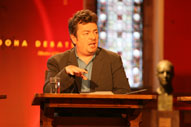
TIM SEBASTIAN
Now let me ask David Aaronovitch, please, to speak against the motion.
DAVID AARONOVITCH
I suppose I stand as the sole representative of Western debate outside the United States, since all previous references have actually been to events inside the United States. There was an attempt that Andrew made to suggest that somehow or other - I think your phrase, Andrew, was, 'There's a little more room here in Britain, but that's probably a measure of the country's lack of importance.' I took that to mean that it wasn't sufficiently important for the pro-Israel lobby to start lobbying hard in Britain, because it wasn't considered to be significant enough. That is, you know, that's a kind of gratuitous insult to this country. However, because we have an ability to debate everything openly, one of the things that you will discover if you stay here for any length of time is that there is a vigorous debate about Israel in Britain, and I would hazard a guess that in France, in Italy and in Germany you could not also possibly say that any Israel lobby controls the terms of the debate or seeks to stifle it, so what I'm going to suggest to do first just as we begin is that what may be arguably true of the United States is simply not true of Europe and therefore you couldn't actually pass this motion on the basis that it was put in any case. It simply isn't true of Britain, that there is an attempt or a big attempt to stifle debate in this country by any so-called Israel lobby. There isn't a big Israel lobby in this country and it doesn't stifle debate. If debate is stifled in this country and in Europe, then as some Danish cartoonists found out to their cost, it isn't coming from any Israel lobby. It comes from a completely different series of sources and a completely different series of sensitivities, and that is a debate probably for another time. As to what you can call things here in Britain, in The Jewish Chronicle, I wrote an article calling what you said is called the fence, a wall, called it a wall. Do you know what, Andrew? I didn't get a single letter of objection from anybody to my doing that in The Jewish Chronicle, so I think what we're really talking about here is something slightly different. Now, everybody here has made a decision tonight, they've made a decision not to watch Chelsea versus Liverpool on the television tonight. One of the conceivable reasons why some of you might not, apart from an abiding dislike of football, is to watch Jose Mourinho do one of his operations at the end where he says that he should have got a penalty but his side was uniquely deprived of the right to a penalty or a bad decision because referees have simply got it in for them, or in the case of Manchester United, he usually argues that referees love Manchester United better because the Manchester United players put pressure on them, and this is known in England commonly, and in Scotland too, as 'we was robbed.' It's the 'we was robbed' defence. The Israel lobby is the great 'we was robbed' attack of those people who believe that history has unjustifiably gone against them, and I submit to you that the problem with this is that it actually constructs not a proper argument, it evades a proper argument while giving you two racial stereotypes for the price of one: the manipulative Jew on the one hand, and the childish Muslim who can't get an argument together on the other, and that's a good reason for rejecting the motion.
TIM SEBASTIAN
Right, David Aaronovitch, thank you very much indeed. Where the motion refers to the United States, you're prepared to believe it, is that right?
DAVID AARONOVITCH
No, I'm not prepared to believe that ...
TIM SEBASTIAN
You said 'arguably', 'arguably' true of the United States.
DAVID AARONOVITCH
Only in the sense that it's unarguably untrue of the rest of the West.
TIM SEBASTIAN
Would you like to deconstruct that into a positive statement? 'Yes, it may be true' or 'No, it won't be.'
DAVID AARONOVITCH
No, I don't think it is true. I think the reason why Americans tend to like Israel is not because of the lobby, of the pro-Israel lobby, though that is a very successful lobby.
TIM SEBASTIAN
And very powerful.
DAVID AARONOVITCH
It may be powerful but it's only powerful because Americans are pre-inclined towards it. They're pre-inclined towards it for two major reasons.
TIM SEBASTIAN
Is it? Well, Martin Indyk says it's powerful because people in Congress are afraid of the wrath that may come down on them through organisations like AIPAC. (to Dr Indyk) You are on record as saying that.
DAVID AARONOVITCH
And the wrath as with The National Rifle Association and with the most powerful lobby of all, which is to do with old people in America, is about the fact that people agree with it. I was going to say the foundation myth of America is very, very similar to the foundation myth of Israel, and the perception of Israel as a democracy in a sea of autocracy is an incredibly powerful reason for ordinary Americans and educated Americans in particular to be pre-disposed, probably too pre-disposed, towards Israel.
TIM SEBASTIAN
And you say no attempt to stifle debate here. Independent Jewish Voices, an organisation that you've actually written about, claim that they are vilified because they take a different line from mainstream Jewish organisations.
DAVID AARONOVITCH
Hold on, hold on. Who gives you the right not to be vilified in a debate? I'll show you letters that I got just this morning where people ...
TIM SEBASTIAN
But they say vigour is one thing, vilification is another, 'an extraordinary amount of abusive language, ridicule and attacks on our character and motives.'
DAVID AARONOVITCH
OK, right. I wrote about them ...
TIM SEBASTIAN
That's stifling?
DAVID AARONOVITCH
Hold on. I wrote about them and said I thought they were wrong. I didn't vilify them. They might write about me and say I'm wrong.
TIM SEBASTIAN
But they didn't.
DAVID AARONOVITCH
They didn't vilify me, but no, no, actually they have done and responded, but people will vilify both of us, and I get vilified as much as they get vilified. There's a lot of vilification going on. I'll show you my post.
TIM SEBASTIAN
I could show you mine too. Thank you very much. David Aaronovitch, thank you very much indeed.
Audience questions
TIM SEBASTIAN
All right, we're going to take some questions now from the floor. There's a gentleman with his hand up at the end of the row there in the brown shirt there, please.
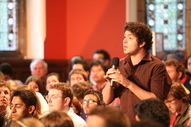 AUDIENCE Q (M)
AUDIENCE Q (M)
I have questions for Martin Indyk and for David Aaronovitch. Both of you focused on exceptions, citing cases where people have succeeded to publish books and so on, but the fact of the matter is that in daily policy, in daily news coverage, we have an ongoing situation where the conflict is misrepresented. In America you'd never see any argument for Palestine on Fox News. You'd never think that Palestine is occupied by watching CNN and that there are severe racial discrimination laws within Israeli society...
TIM SEBASTIAN
Okay, and your question please. Can we have your question now please?
AUDIENCE Q (M)
Here in Oxford as a student organiser, I would like to mention that here in Oxford we were denied rooms to speak about Palestine, so how can you claim that debate isn't stifled in England? Thank you.
MARTIN INDYK
Well, I'll leave David to talk about what happens here, but in the United States, it's true that Fox News is hardly fair and balanced in its approach to any subject. I think CNN does a much better job, but on the question of the Palestinians getting their story out, I just think that that's another myth. I think the Palestinians' story is out there day in and day out, and it's reported from all sides, and it's reported in all of the major newspapers as well as the mainstream television networks, and you know, the same argument is made about the BBC, that the BBC is somehow pro-Arab and anti-Israel, and I think that this is simply a manifestation of people not liking what they see because they happen to have a different point of view, but the notion that the Palestinian cause is not getting covered in the United States is simply flat out wrong. It gets huge coverage.
ANDREW COCKBURN
That's not entirely true, Martin. I mean, it gets a lot of coverage but it's not exactly an accurate coverage. I mean, we can look at a lot of examples but like Camp David, it's been repeated endlessly, I think by yourself included, that following the negotiations at Camp David in the summer of 2000, or during those negotiations, the Palestinians led by Yasser Arafat rejected an offer by Israel to give them practically everything they'd ever wanted. That is flat out not true, as has been actually explained by some of the US officials who were there.
TIM SEBASTIAN
But it's not the Clinton view and he was there.
ANDREW COCKBURN
Well, it's Robert Malley's view, it's also Shlomo Ben-Ami's explanation.
TIM SEBASTIAN
So Clinton's wrong?
NORMAN FINKELSTEIN
Let's take that specific example and let's see whether we're getting an accurate picture of what's happening, in particular let's see if Martin Indyk is rendering an accurate picture of what happened. Very quickly let's go through the record. It'll take a half-minute.
MARTIN INDYK
I don't think you've seen my book.
NORMAN FINKELSTEIN
I've read your accounts, Mr. Indyk.
MARTIN INDYK
No you haven't, they haven't come out yet.
NORMAN FINKELSTEIN
I've read your account before the Congress. In July 2000, there are negotiations. They ended in impasse. Shlomo Ben-Ami, Israel's own Foreign Minister and a main negotiator, he himself said, 'If I were a Palestinian, I would have rejected the offer at Camp David in July 2000.' There are new negotiations. They continued till December. In December, President Clinton presents his famous parameters. Both sides, both sides accepted the parameters with reservations. How does Martin Indyk report it to Congress? He says, 'Only Arafat rejected the Clinton parameters'.
TIM SEBASTIAN
Okay, let's have Martin Indyk reply to that.
MARTIN INDYK
Thanks. Look, I agree with what Norman just defined in terms of what happened in July at Camp David. He doesn't know what my view of that is. Barak did make a generous offer there, but I don't think it was an offer that Arafat could possibly have accepted. In December of 2000 it was a very different story. Notwithstanding the violence and terrorism that had taken place from October on, the Clinton administration, President Clinton put down a very clear offer of a Palestinian independent state in all of Gaza and 95-97% of the West Bank, with territorial compensation for the 3-5% that might be absorbed into Israel; East Jerusalem as the capital of the Palestinian State including sovereignty for the Palestinians on the Haram Al-Sharif where the two holy mosques are, and all of the Palestinian Arab suburbs of Jerusalem would be under Arab Palestinian sovereignty, and a just solution for the refugees. What happened? I was ambassador in Israel, I received the cabinet decision that was taken by the government of Israel and conveyed it to President Clinton, accepting the parameters and then going through what the history had been of Israeli concessions up to that point. Yasser Arafat said to the President that he had a problem with four issues, I'll be glad to go into them. He did not accept them and he went away and as a result of that ...
TIM SEBASTIAN
Excuse me, we're going to move this on, there are a lot of people waiting.
MARTIN INDYK
... the process failed.
TIM SEBASTIAN
Thank you. We're going to move this on. There was a gentleman who had his hand up in the fifth row there, you sir, yes.
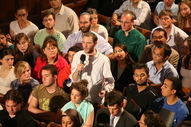 AUDIENCE Q (M)
AUDIENCE Q (M)
Good evening. Actually I'm not convinced by what Mr. David is saying, that there's no lobby in Britain or in Europe. Why is there a lobby in the United States and no lobby in Europe, where probably more Jews who actually suffered the Holocaust are living in Europe right now?
TIM SEBASTIAN
David Aaronovitch, do you want to take that?
DAVID AARONOVITCH
It's kind of a hard point because it's almost an inductive piece of logic. If there is one in America, which is incredibly powerful, why wouldn't there be one here? I can't answer that. All I can tell you is that nobody in Britain, I don't think, feels the heavy hand of any so-called lobby stifling the debate, and with regard to what the friend over there said, I don't know the specific circumstances under which you couldn't get a room for a Palestine meeting here, but there are hundreds all over the country of Palestinian meetings happily being held all over the place. Both sides incidentally call foul on each other in British academic life, as I'm sure you're aware, continuously, Jewish students continually say that the Students Unions are trying to do them down, and so do Muslim students continuously say ... And I learned as President of the National Union of Students, it was part of the warp and weft of the way in which students debated things, but if you seriously want a Palestinian meeting here in Oxford, I think you could get a place to have a meeting for it at a click of a finger.
TIM SEBASTIAN
All right, lady in the fourth row there.
AUDIENCE Q (F)
Good evening. My question is for the team against the motion. The Jewish community in the US is one of the most powerful communities in terms of financial power and political influence. Don't you think that these elements play a role in steering the US foreign policy towards Israel's interests, or in favour of these interests?
MARTIN INDYK
I think it's true to say that the Israel lobby in Washington is a powerful lobby. It proclaims its power openly, and certainly the Jewish community has both financial resources and political weight, certainly in the Democratic Party, but in certain other places as well, but it's important to understand, and I don't think that it's fully appreciated by people who have not lived in the United States, that our political system is different to the political system say here in England. The political system in the United States depends on the lobbying process. There is a vast avenue called K Street in Washington full of these 12-storey high buildings that is densely populated with lobbyists.
TIM SEBASTIAN
They don't all have $50 million at their disposal.
MARTIN INDYK
And yes, so the Israel lobby is effective, but as David said, I'll just back it up because I think he's exactly right, for the last 30 years, 60% or more of the American people have a favourable impression of Israel and the most the Palestinians have ever scored on that scale has been I think 20%. That's just a reality, that's not because of the power of the Israel lobby. That's because there is an identity with Israel, especially after 9/11 when Palestinians were out in the streets celebrating, the terrorism phenomenon played to Israel's advantage.
NORMAN FINKELSTEIN
The question is, what created the image. Yes, it's true, Americans overwhelmingly support Israelis against Palestinians. Is that because it reflects the natural record, or is it an image of Israel that's been created by the Israel lobby that accounts for those statistics. Let's take a simple example.
TIM SEBASTIAN
Before you do, I want to go back to questioner, she has more to say on this.
AUDIENCE Q (F)
The reason that I'm really interested in this question is because the US claims to be the number one power in the world and all of its decisions affect other places in the world like Afghanistan, Iraq, the Middle East, and so on and so forth, so basically for the US to be biased or to be in favour of Israel, that would create some sort of an imbalance in the world.
DAVID AARONOVITCH
I actually have quite a lot of sympathy with that as a general proposition, but the problem is that focusing on the motion of an Israel lobby gets it almost precisely wrong. I mean, Norman Finkelstein says that the reason people have a favourable impression of Israel in the United States is because, primarily because, mostly because, solely because of the work of an Israel lobby in kind of he actually said 'in whipping up controversy in order to sow confusion,' which is an extraordinary kind of active agency on behalf of anybody, it's unbelievable actually, but the reality is, it wasn't the Israel lobby that made Egypt, Jordan, Syria dictatorships, and the Americans believe in democracy, they do. They might believe in it rather simple-mindedly, they might believe in the export of it in a kind of simple-minded way. They may even close their minds to where it hasn't been exported and so on, but by and large, given the choice between democracy here and autocracy here, they're going to go for the democracy, and that's the fact. Now, you can say that Israel's a flawed democracy ...
TIM SEBASTIAN
Not with Hamas, are they, they're not going to take it from Hamas, are they?
DAVID AARONOVITCH
No, no, no, they're probably not going to take it from Hamas, because unfortunately it's quite difficult to take it from somebody who votes with the one hand and sends a suicide bomber to some place with another hand, and there is a problem, and it's a problem as much for the European countries as it is for the United States.
TIM SEBASTIAN
Do you want to jump in on this, very briefly please?
MARTIN INDYK
I think there's an important point here. The American people also support the United States playing an active role in resolving the Israeli/Palestinian problem, and any president who does that will get the support of the American people, regardless of what the Israeli lobby thinks or doesn't think. Yasser Arafat was the most frequent visitor to the Clinton Oval Office, and the American people supported that because President Clinton and his peace team, of which I happened to be part, to try and resolve the Israeli/Palestinian problem.
ANDREW COCKBURN
Clinton may have spent a lot of time talking to Yasser Arafat but clearly to no effect on Clinton's part. Clinton for example one of the things he said to Arafat was, 'If you come to Camp David for negotiations in the summer of 2000, and they break down, I give you my word I will not blame the Palestinian side,' on which he promptly reneged, and was part of the very elaborate and extensive and successful spin effort put on after the negotiations to blame the Palestinians for the breakdown. I'd also like to just ...
MARTIN INDYK
He didn't renege on that.
ANDREW COCKBURN
He reneged on his commitment.
MARTIN INDYK
He didn't renege on it ...
ANDREW COCKBURN
He did, immediately.
MARTIN INDYK
... because of the Israel lobby. He reneged on it because of a genuine emotional concern about the fact that Ehud Barak was now in real political danger and Yasser Arafat ...
ANDREW COCKBURN
Whatever, he broke his word for a reason.
MARTIN INDYK
... has risked nothing.
ANDREW COCKBURN
He broke his word.
TIM SEBASTIAN
We're going to take a question from the gentleman at the back in the white shirt.
ANDREW COCKBURN
And told a lie, by the way.
AUDIENCE Q (M)
Hello, my question is to the opposition. With Howard Dean unable to say in the first round of the democratic elections in 2004 that he favoured an "even-handed approach" towards the Israeli/Palestinian issue, without being accused of hostility to Israel, and Barak Obama being forced to apologise for stating the very real truth that 'nobody is suffering more than the Palestinians', h
ow can anyone claim that the debate is not being stifled at least in the US?
TIM SEBASTIAN
David Aaronovitch.
DAVID AARONOVITCH
Look, all electorates have their pieties, and all politicians are forced to play along with aspects of those pieties in this country as much as in other countries, and I don't see why you would put that down to the work of some great super ego lobby. The problem is that the American people tend to see things in those terms. Now, of course, the lobbying organisations on the side of Israel will play their part in trying to make sure that's the case, as will lobbying organisations to a lesser extent but also special interest organisations in this country and so on, but that doesn't force Barak Obama to do it.
ANDREW COCKBURN
Yes it does, very clearly.
NORMAN FINKELSTEIN
I'm having a real problem with this constant invocation of what the American people believe without first trying to examine why do they believe it, which seems to me an obvious preliminary question. So why do they believe it? Let's take some obvious examples. We're told in the American media that all these questions in the Israel/Palestine conflict, the question of borders, the question of settlements, the question of Jerusalem, we're told they're very complicated. They're so complicated, they have to be put off to what are called 'the final status negotiations,' and one of the main organisations insisting on the complexity of these issues is the ones to which Mr. Indyk is associated, and he tells you the settlements question is very complicated, Jerusalem is very complicated, the borders are very complicated. But then you turn to the World Court, the highest judicial body in the world, and they rendered a decision on all of those questions.
TIM SEBASTIAN
We're not debating those points. We're debating the Israel lobby.
NORMAN FINKELSTEIN
Yes, but the question is, why don't people know these basic, uncontroversial facts? How do you account for that? And the only rational explanation is, there is a lobby out there which is desperately trying to confuse people about the elementary, uncontroversial record on this subject.
MARTIN INDYK
Listen, a historic injustice has been done to Palestinians, but the question is, how can we address that, and the best way to address it, the best way out there is a two-state solution. Norman is absolutely wrong in portraying my position on this. I actually believe that those issues, while they have been complicated are now actually resolvable, and the question is, how do we get there to resolve not so much on the basis ...
TIM SEBASTIAN
Can we please go back to the question at hand? We're going to go back to the question at issue, and I'm going to take a question from the front row, thank you very much.
NORMAN FINKELSTEIN
That's why he's employed and I'm not.
TIM SEBASTIAN
Taking a question from the front row.
AUDIENCE Q (M)
I think there's a danger that this debate is getting slightly conspiratorial, particularly from the speakers in the proposition. You're talking about these big ideas and these sort of people lurking in the background. People have mentioned Barak Obama who's of course running for president and I wish him well, but he was asked in a question last week who he thought the United States' top ally was, and on that list he did not include Israel, and he mentioned the EU as the most important partner for the United States in the future. Now, do you not think that setting the tone of the Democratic primary race in the United States of America without Israel, without this huge lobby that you say is charging up the debate and trying to whip everybody up into thinking that that's the only real live issue is evidence of the fact that people have actually moved on, that what you might have been saying would have been true 20 or 30 years ago but certainly isn't today?
ANDREW COCKBURN
Is that true? I absolutely wish that were true. I mean, it's nice that Barak Obama managed to make a speech about allies without mentioning Israel but you can find his record is replete with, once he started running for president, long ago he sat at a dinner with Edward Said and he's doing his best to make us forget that - he actually went to the length of saying that he thought that the emergence of the unity government in Palestine was actually a worrying development. You can take it right down to his shameful withdrawal of his statement about Palestinian suffering. I'm afraid I wish things had moved on, and every few years I think, 'Oh good, the debate is really moving on'. With Oslo, I wrongly thought that. With Camp David in the summer of 2000 I thought that. Jimmy Carter being a best-seller, I thought that, and then my hopes are inevitably dashed because you have the entire top leadership of the Democratic Party announcing that Jimmy Carter does not speak for the Democrats, despite his rather anodyne proposals, so I wish I could reassure you, but I'm afraid that we're still stuck in this same rut, and I just want to make one point. I'm sorry to have offended David's nationalist sentiments here by belittling Britain's status in the world, but the fact that the British government on this issue absolutely and subserviently toes the line of the American government on the question of Israel/Palestine in every respect ...
DAVID AARONOVITCH
Of course it doesn't.
ANDREW COCKBURN
Yes it does.
DAVID AARONOVITCH
Of course it doesn't. Utter and complete rubbish!
TIM SEBASTIAN
Let him reply to that please.
DAVID AARONOVITCH
Andrew, you have been away too long. One of the things that the government has most assiduously pushed to the irritation of quite senior figures in the administration was the absolute necessity of the United States renewing its role to attempt to try and get some kind of solution in the Middle East, to the cost of the Prime Minister's own reputation significantly, and you write this off. No, it's not nonsense. And if you thought that was the case, would you ascribe this somehow or other to the magic Israel lobby in Britain? Would you, would you?
ANDREW COCKBURN
Well, I think Tony Blair is very conscious, well, I think he's more conscious of the American .......
DAVID AARONOVITCH
It's Lord Levy, isn't it? It's Lord Levy and his money, come on, say it!
ANDREW COCKBURN
...the Israel lobby in the United States dictates American policy as you know, to which Tony Blair is the obedient poodle, as you know, so it really doesn't matter what the debate is here, because Tony Blair is going to do what he's told.
TIM SEBASTIAN
All right, we're going to take a question from the gentleman in the fourth row there.
AUDIENCE Q (M)
I have a question for Dr. Aaronovitch.
DAVID AARONOVITCH
You dignify me. I'm no doctor.
AUDIENCE Q (M)
Excuse me, I was being polite.
DAVID AARONOVITCH
In that case, may I say, 'Thank you, Professor.' (laughter)
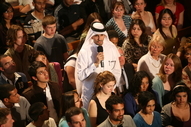 AUDIENCE Q (M)
AUDIENCE Q (M)
Thank you very much. You mentioned that one of the strongest aspects of the Israeli lobby and the reason why it's so strong is that Israel is a democracy. My question to you is that Hamas was democratically elected and although it does not have the means or the financial support to create such a strong government as that of the Israelis, why has it not been accepted by the United States, and isn't that a sign that the Israeli lobby has stifled in fact the acceptance of this democratically elected state?
DAVID AARONOVITCH
It's a very good question but note what you've left out. You've left out that it was also rejected by the European Union. No, hold on, even Andrew has not until now, if he wants to, can now suggest that the EU is also in the pocket of the Americans, in which case your line of demonology works like this: The Americans are in the pocket of the Israel lobby, Britain is in the pocket of the Americans, the EU is somehow despite Iraq in the pocket of the Americans as well, therefore ergo the West is in the pocket of the Israel lobby. And anybody who believes that the question of the right of return of Palestinians is not a complicated question must indeed answer that the answer to everything is that the Israel lobby is behind everything.
AUDIENCE Q (M)
You haven't really answered my question.
DAVID AARONOVITCH
No, to be honest, to be absolutely honest, I've forgotten your question.
AUDIENCE Q (M)
I asked you and I'm not sure if you've had difficulty answering the question or understanding it, but my question to you is, why hasn't the United States accepted Hamas as a ...
DAVID AARONOVITCH
Oh yes, and it is a good question, and it's not just the United States. Why has the EU ...
AUDIENCE Q (M)
I don't want to know about Europe, I want to know about the United States.
DAVID AARONOVITCH
No, no, I want to talk about Europe. I want to answer in my own way.
AUDIENCE Q (M)
But you haven't answered my question.
DAVID AARONOVITCH
Maybe there are dangers in my answering in my own way but I'm still going to do it. Why have the EU and America not recognised the Hamas government? They have not recognised the Hamas government because Hamas refuses to recognise the right of Israel to exist, and also has not rejected terrorism. That's the formal reason. Now, I personally believe that was an error. I can see why the error was made, and there are very good reasons in Europe in particular, there are very particular sensitivities about toleration of terror and so on. I think it was a strategic error. The strategic error permitted people to say exactly the thing that you're saying, 'You're inconsistent' and so on, so I think it was an error, but I think it was an error that was made in good and not in bad faith.
NORMAN FINKELSTEIN
May I quickly address that? Let's agree everything Mr. Aaronovitch just said is true, for argument's sake. There's an elementary principle of international law, it's called reciprocity. If you apply a law to one side, it's called hypocrisy. If you apply it to both sides, then it's called a moral statement, so let's look at this. He says Hamas is not recognised by the EU and the United States because Hamas won't recognise Israel. Now, the logical question is, can you name a single Israeli government official, political party, which has ever recognised a Palestinian state within its internationally legal borders, namely the whole of the West Bank, Gaza, and East Jerusalem as its capital? That's the law, that's what the World Court said. The question of terrorism, yes, Hamas should renounce the use of terrorism. Well, what about Israel? According to the most recent reports, human rights reports from B'Tselem, the Israeli Information Centre for Human Rights, 4,000 Palestinians have been killed against 1,000 Israelis. On both sides the vast majority have been civilians.
DAVID AARONOVITCH
What has that got to do with it?
TIM SEBASTIAN
All right, okay. I think we need just a reminder of what the motion is that we're discussing, that 'This House believes the pro-Israel lobby has successfully stifled Western debate about Israel's actions.' I'm going to take a question from the lady in the third row there please.
AUDIENCE Q (F)
This question is for Mr. David. $200 million dollars were given by the United States to support Israel in its invasion of the West Bank in 2002, yet ironically President Bush only a few days earlier declared the Israelis withdraw from the area immediately. How do you explain this contradiction and clash of interests where on one hand the US was against this invasion, and on the other hand it funded Israel and its war?
TIM SEBASTIAN
Before you answer, your suggestion is then that it's because of the pro-Israel lobby.
AUDIENCE Q (F)
Because of the lobby, yes.
TIM SEBASTIAN
Okay.
DAVID AARONOVITCH
I simply don't know anything about $200 million. I mean, it's an assertion that you make, I have no idea whether it's true or not. I think one of the great difficulties that there has been right from the election of the Bush presidency, when it first came in intent on not, it thought, repeating the mistakes of the Clinton presidency, one of its greatest mistakes was to disengage from the Middle East peace process, and I don't think that by and large it's been even-handed since then. I don't think that's to do with the Israel lobby particularly. I mean, I think that's to do with the orientation of the Bush government, and I think it's been one of the features, whatever Andrew says, of the British government that has attempted to use whatever means it can to try and push the Bush administration back on track, and I support that, despite being obviously nothing in myself but a tool of the Israel lobby.
TIM SEBASTIAN
We'll take a question from the gentleman in the third row, you sir, yes.
AUDIENCE Q (M)
Thank you. I just want to say first that I think that whenever Israel or Palestine is brought up, people have already made their minds up. In reference to what the proposition said about the media, the National Union of Journalists in this country voted to boycott Israel. There have been plenty of moves to boycott Israeli academics, no matter what fields they're in. If the pro-Israel lobby is so successful, where were they on this one? Where were they when the National Union of Journalists boycotted Israel, where were they when the academic unions boycott Israel?
MARTIN INDYK
The boycott of Israel by the National Union of Journalists is the definition of stifling debate.
ANDREW COCKBURN
Well, no, to be fair, Martin, as you probably know, they agreed to stop buying Israeli goods, they didn't say they'd stop writing about Israel, they didn't boycott coverage.
AUDIENCE Q (M)
Excuse me, the academic union said that they would not collaborate with any Israeli professors, no matter what field they were in.
ANDREW COCKBURN
Well, they were following on the precedent that was actually rather successfully followed with relation to South Africa, a comparison that people don't like making.
DAVID AARONOVITCH
Were you in favour of that?
ANDREW COCKBURN
I don't actually, boycotts generally, no, I'm not in favour of boycotts.
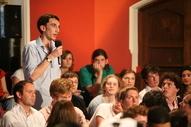 AUDIENCE Q (M)
AUDIENCE Q (M)
If they're so powerful, why did they not stop it?
ANDREW COCKBURN
Well, they did actually. Is there a boycott?
AUDIENCE Q (M)
Yes.
ANDREW COCKBURN
Are British academics boycotting Israel?
DAVID AARONOVITCH
Just a matter of clarification, the vote was rescinded after a pretty short time by a recall conference.
AUDIENCE Q (M)
Because the union was disbanded I believe, or it merged with another union. The fact is, the vote was made. If the pro-Israel lobby is so powerful, why couldn't they stop it from voting yes?
ANDREW COCKBURN
They got it rescinded right away.
TIM SEBASTIAN
Let's deal with this very quickly and then we're going to move on.
DAVID AARONOVITCH
Listen to that, just listen to what that man (pointing to Andrew Cockburn) just said, 'They got it rescinded.' I'll tell you who got it rescinded, the members of the union who didn't like it got it rescinded. They, whoever they are, Andrew, those shadowy people didn't get it rescinded, that was a democratic vote. Maybe you don't quite get that thought.
TIM SEBASTIAN
OK. We're going to take a question from the lady in the third row please.
AUDIENCE Q (F)
I just have a quick question for David Aaronovitch who just again now has accused in a way people criticising the Israel lobby of perpetuating racial stereotypes. Three times today you've referred to 'the other side' as Muslims, and I just wondered, are you not doing the same thing?
DAVID AARONOVITCH
What 'other'?
AUDIENCE Q (F)
Well, you talked about the Israel lobby on the one hand, and Muslims on the other, and you also said at one point that effectively that Muslims are in fact the ones trying to stifle debate in this country.
DAVID AARONOVITCH
No, no, let's get this absolutely straight. I don't regard Muslims as 'the other side,' but it is perfectly true that in this country, we have what, I think 1.3 million Muslims and we have I think a Jewish community of around about 300,000, so if you were simply to locate where you thought your interests were in voting terms, if you were a politician, then in that case you would be inclined to put your vote where you thought the Muslim communities were likely to place their votes, and the tendency it is believed by political commentators would be the pro-Palestinian case. In the case of the Danish cartoons, the point that I was making was that the threat of censorship to various parts of debate in this country and the rest of Europe tends not to come from anything called the Israel lobby but comes from possibly from a degree of sensitivity to the religious and cultural demands of other people. There was a very good article by Johann Hari in The Independent at the end of last week where he pointed out how far in the case of German courts that has gone in accommodating certain husbands in having rights over their wives which couldn't exist in common German law, and that is a genuine problem.
TIM SEBASTIAN
Okay. Lady in the second row. Right on the end there, thank you.
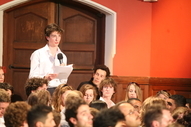 AUDIENCE Q (F)
AUDIENCE Q (F)
Would you not agree that instead of the defensive argument that America helps Israel because they have common enemies, the US has actually made enemies as a result of this pro-Israeli lobby, therefore stifling debate, as it gives the US a bad image?
TIM SEBASTIAN
Martin Indyk, do you want to pick up on that?
MARTIN INDYK
Well, I'm not sure of the connection between the reputation the United States gets and the issue of stifling debate. I don't know if you want to clarify that, but if you're saying that the United States' support for Israel costs it internationally, I think that that is probably correct if you're talking about the Arab world and the Muslim world, and that's a large part of the rest of the world, for sure, but the United States supports Israel for a whole host of reasons that don't include an applause meter in the Arab world. But pursuing a peace between Israel and the Palestinians, and Israel and the Arabs is the best way to resolve that problem, and that's where I agree with David that the Bush administration fell down, did something that was damaging to American interests. But they didn't do it because of the Israel lobby, because there were people on the Israel lobby who wanted the United States to be actively engaged in providing peace in the Middle East because that serves Israel's as well as America's interest because Israel's highest interest is to achieve peace with its neighbours.
TIM SEBASTIAN
Okay.
NORMAN FINKELSTEIN
Mr. Indyk says the United States versus the Arab world or the United States versus the Arab world and some other countries. Well, what is the reality - not the image projected - what's the reality? You go to the United Nations General Assembly, every year they vote on what's called the peaceful settlement of the Palestine question. There's the whole world on one side, literally, the whole world on one side and the other side you have the United States, Israel, Nauru, Palau, Tuvalu, Micronesia, and the Marshall Islands. That's it. It's not a question of the United States versus the Arab world, the Arabs versus the Israelis. It's exactly what President Bush said in 1990, you remember President Bush Senior, he said, 'It's not Saddam versus the United States, it's Saddam versus the world,' and exactly the same way the problem here is not Israel versus the Palestinians, the United States and Israel versus the Arab World. It's the whole world on one side and the United States and Israel on the other, and that you will never know from reading the mainstream media.
TIM SEBASTIAN
All right, OK. Gentleman at the back, you've had your hand up for a long time. Yes, you sir.
AUDIENCE Q (M)
Hi. I just wanted to ask if the lobby is not so strong, why has Congress or the Senate never ever in its history for the last 30 years passed anything against Israel, nothing.
MARTIN INDYK
The proposition's not that the lobby is strong or not strong. The lobby is strong. It's strong in Congress. That's where it manifests itself and that's the reason. There is strong support for Israel in the US Congress.
AUDIENCE Q (M)
Don't you think that has stifled debate in terms of at least the administration politicians where a newspaper
like Ha'aretz has a column called The Israel Factor where it grades every single politician out of 10 for how good they are for Israel. None of them are against Israel, it's just which is the best for Israel and which is the least worst, and they compete with each other, Democrats, Republicans, it doesn't matter. How is there not a stifling of debate in the most important thing, political sphere?
MARTIN INDYK
I think that what you're doing is conflating several different things here. That the lobby is powerful in Congress and ensures that the Congress is supportive of Israel is true. Does that mean that the lobby stifles debate? No, that's not true. There's a huge debate that goes on in the United States, and your example of Ha'Aretz, it's an Israeli newspaper anyway, there's no American newspaper that's running a poll ...
AUDIENCE Q (M)
The only debate I've seen in terms of the Israeli war and Hezbollah for example, the only debate I saw was Democrats attacking Bush for being too soft on Hezbollah and not supporting Israel enough, like a motion was passed saying, not a motion was passed but so many were saying why isn't he supporting the war?
MARTIN INDYK
Look, it's a complicated world, you know. There are a number of Arab states who were cheering Israel on as well and a number of Lebanese who were cheering Israel on as well in that war.
ANDREW COCKBURN
I just need to say this point about the Congress, it's not just the Congress. If it was just the Congress, it would be a very different situation. I mean, you know, we've had comparisons of the National Rifle Association lobby, very powerful, supremely powerful in Congress, but you can get up and run for office against the National Rifle Association for gun control and no-one tries to demonise you or drive you out of public life. That's different with the Israel lobby. It's across, it's the Congress, it's the executive branch and it's in the culture, in the media.
TIM SEBASTIAN
All right. Gentleman in the front there.
AUDIENCE Q (M)
Let us just say at the moment that the debate is successfully stifled in the West. I think in that case it is also fair to say that the debate is successfully stifled in the East and Middle Eastern states. Would you say there is a very strong pro-Palestinian lobby in those states that makes them wholeheartedly side and stifle debate there on the Palestinian side? Because if not obviously your inductive logic does not follow.
NORMAN FINKELSTEIN
Well, nobody's going to make the argument that there's free debate and discussion in the Arab world, but the key question to my thinking is, who or what entities are the obstacles to resolving the conflict? That's why we're all here. If you look at the Arab world, the Arab initiative April 2002, Martin Indyk in his congressional testimony, he portrayed it accurately. He said the Arab League, all 15 members, were offering full peace and normalisation with Israel in exchange for a full Israeli withdrawal. That's the opinion of the whole international community. That's the basis to settle the conflict. The Arab World, however stifling, there is discussion there and I won't dispute it, on the key question of resolving the conflict, the Arab World is with the entire international community, a two-state settlement based on the June 1967 borders. It is Israel and the United States which are out of step with the whole world and it's because of the lobby, they're the problem.
DAVID AARONOVITCH
Not withdrawal to the 1967 borders though, Martin. Israel has not proposed that I don't think.
MARTIN INDYK
Listen, as a matter of fact, whenever Israel has had an Arab partner sitting down and negotiating with it, the consequence of that negotiation is for Israel to offer withdrawal, full withdrawal, to the 1967 borders. It happened with Egypt, it happened with Jordan, four Israeli Prime Ministers offered it to the Syrian President, and he didn't take the offer, it happened with Lebanon, and in the case of the Palestinians, we have had an Israeli government, the Barak government, as I said, that was prepared to offer a two-state solution on the basis of 100%, that is, 95-97% plus territorial compensation for 100%, and so if we could ever get back to the table, that is not going to be the problem.
TIM SEBASTIAN
Andrew Cockburn, you want to come back just briefly and then we're going to move on.
ANDREW COCKBURN
The famous Israel offers of 2000 at Camp David was to offer basically a series of Bantustans.
MARTIN INDYK
Well, that's not true.
ANDREW COCKBURN
It is.
MARTIN INDYK
That is the propaganda line put forward by people who have to find a way of explaining why Arafat rejected the offer.
TIM SEBASTIAN
Okay, we're going to move on now.
NORMAN FINKELSTEIN
Martin Indyk went before Congress and he said that Ariel Sharon accepted the two-state settlement as depicted in the road map. That's what you wrote. Now, you take The Economist magazine. It described the two-state settlement offered by Ariel Sharon as withdrawal from 40-50% of the West Bank, so I ask you, Martin Indyk, 40-50% withdrawal, is that the road map? Is that the road map, Martin? Or was that a lie, misinformation?
TIM SEBASTIAN
Let him just answer that very briefly.
MARTIN INDYK
Last time I checked, Ariel Sharon is not the Prime Minister of Israel. The person who is now the Prime Minister of Israel, Ehud Olmert, was elected with a mandate to withdraw from the West Bank.
NORMAN FINKELSTEIN
The West Bank or parts of the West Bank? You know, it's a big difference, Martin.
MARTIN INDYK
Oh, it's a big difference, for heaven's sake. Everybody knows, Norman, and you know it as well, what the outline of the deal is going to look like, you know. The Israelis put up a wall, you want to call it a wall, we'll call it a wall. They put up a wall that incorporated 8.5% of the West Bank.
TIM SEBASTIAN
I'm going to ask that we talk about the motion please. Excuse me, thank you. I'm going to take a question from the gentleman up there, yes, you. You've had your hand up for a very long time. .
AUDIENCE Q (M)
Thanks. Focusing on the question, it mentions the pro-Israeli lobby. Can we first just define what we mean by the pro-Israeli lobby. It's not the Jewish lobby.
TIM SEBASTIAN
Who would you like to do that?
AUDIENCE Q (M)
Both sides on this. The pro-Israeli lobby has enormous power from Protestant fundamentalists and they have a huge influence on the Republican vote, whereas Jewish Americans tend to vote more Democrat, so in a sense both parties have got an interest in getting majorities and not offending the pro-Israeli lobby, and by defining it as a Jewish lobby, a) it's got an anti-Semitic connotation ...
TIM SEBASTIAN
Can we come to a question?
AUDIENCE Q (M)
Okay. My question is, how far is this pro-Israeli lobby responsible for the stifling of debate and how far is it just the fact that Israel's America's ally and you wouldn't get an honest debate on Cuba or Nicaragua or any other country where America's got vested interests?
TIM SEBASTIAN
Who wants to take that?
MARTIN INDYK
It comes back again to the basic proposition, that the American people are basically, they identify with Israel and that's the best explanation, whether it's Evangelicals or whether it's Jews or whether it's Blacks, they happen to identify with Israel historically, with Israel's values and with Israel's struggle to achieve peace. You know, that's just the narrative in the United States that's identified with and that's the heart of the matter. It's the simple explanation. It doesn't require conspiracies and stifling of debate to simply understand that the American people are fundamentally pro-Israel. As a consequence of that, every president and every Congress, whether it's Republican or Democrat controlled, since the creation of the State of Israel, has been fundamentally supportive of Israel.
ANDREW COCKBURN
Yes, but the American people, you can't say the American people support the illegal occupation of other people's territory. You can't pretend that the American people are really in favour of keeping a subject population on the verge of starvation, which is the case with the Palestinians. You can't believe that the American people believe in what is very certainly a policy of apartheid, of the creation of Bantustans, and this is the situation in the occupied territories.
TIM SEBASTIAN
David Aaronovitch.
DAVID AARONOVITCH
Andrew, for once, I think you've got a point. I think they don't believe those things and I think that if they were to believe that there was a serious route out of those things happening which could be negotiated, they would be immensely in favour with it and immensely opposed to anybody who got in the way of it, and that is the reason incidentally why Baker and Bush 1 went to Madrid in 1991 and effectively lost the Israel premier his job as a consequence of that. They told them what to do. That's why in 1967 by leaked State Department papers that we've seen only this week, America was contemplating taking military action against Israel if it went too far in invading the territory of its neighbours in an aggressive manner. In other words, there are things that the American people won't wear, and if there was therefore, I mean, I would like to see something big come out of the Saudi initiative, I would really like to hope that that's going to be the case. I would like to see, you know, we talk about what entities, Norman, are the obstacles to the achievement of peace. In a small way I would say this evening you've proved that you're one, OK, in a very, very small way. There are plenty of obstacles to the achievement of peace and one of the things that these debates do or have the possibility of doing is they have the possibility of allowing those avenues to open up and take away the demonisation. There are sections of the pro-Israeli argument that I find racist against Arabs and that I find highly chauvinistic. They call people like me self-hating Jews, although in fact actually technically I'm not Jewish at all, just as people from the other side will describe me as part of the Israel lobby for exactly the same reason, they have to kind of identify you. I know the obstacles to the achievement of peace, they're the people who simplify, they're the people who say things like the right to return is an incredibly simple question that could be solved like that.
NORMAN FINKELSTEIN
I said under international law, I never said about its practical application.
DAVID AARONOVITCH
But it's not simple.
NORMAN FINKELSTEIN
Its practical application is difficult.
DAVID AARONOVITCH
Fine, we agree.
NORMAN FINKELSTEIN
The legal right of return, allow me just briefly, David says if the American people knew there was an easy way out, then of course they would support it, but that's the problem, there is a way out, there has been for 30 years. The problem is the American people don't know it. It's exactly what Martin Indyk told Congress. He said, 'The Saudi initiative, the Arab initiative, calls for full normalisation and peace in exchange for the full withdrawal.' That's the answer. The American people don't know it. The reason they don't know it is because of the Israel lobby. If they knew it, the American people would join ...
TIM SEBASTIAN
All right. Just very briefly please.
MARTIN INDYK
I don't understand that. If I, you know, supposedly part of the pro-Israel lobby was telling the Congress, then what point are you trying to make here? The basic point, Norman, if you had a Palestinian top man now that was capable and responsible, you'd have a negotiation
TIM SEBASTIAN
Okay, all right. Gentleman almost at the back, in the row just before the back, in the blue shirt.
AUDIENCE Q (M)
Thank you. A number of times during this debate, Barak Obama's remarks have come up and unlike Mr. Cockburn, the gentleman to my left quoted him correctly saying that no-one is suffering as much as the Palestinians, and the main thing about that statement is it's demonstrably false, because it doesn't matter if you take violent death, GDP per head, infant mortality, average life expectancy, there are huge amounts of people suffering more than the Palestinians. Nevertheless I think most people would agree that the Israeli/Palestinian situation receives more air time in the Western media than any other foreign problem, except possibly American elections and things.
TIM SEBASTIAN
So what is your point?
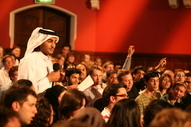 AUDIENCE Q (M)
AUDIENCE Q (M)
Now, given this it's true that there is a debate about Israel and that your problem is not that it's been stifled, because it's not, because it's out of all proportion to its genuine importance, your problem is that you haven't got the hegemony over the debate that you think you deserve, and that frankly you can't hack it.
TIM SEBASTIAN
Andrew Cockburn.
ANDREW COCKBURN
First of all, Obama was clearly talking in the context of Israel/ Palestine, so it's really your point is kind of beside the point. No-one's demanding hegemony, well, no-one on this side is demanding hegemony over the debate. We're just pointing out that the debate is very one-sided, that for example Martin may have told the Congress that the Saudi initiative offers a full withdrawal, but we don't read that in the papers.
DAVID AARONOVITCH
What, he stifled himself? How did you manage that, Martin?
ANDREW COCKBURN
No, Martin didn't stifle, I think he may have said in full expectation it wouldn't be a headline in The New York Times the next day.
MARTIN INDYK
I'm a great advocate of the Saudi initiative because I'd like to see this problem solved.
TIM SEBASTIAN
Let him finish his point.
ANDREW COCKBURN
It's frequently said, I think I've heard it from the hall here tonight, that Hamas, David was saying that the European governments imposed the sanctions on Hamas because they refused to recognise Israel's right to exist. They, Hamas, have accepted the Arab initiative of 2002. You know, there's lots of rhetoric on all sides.
MARTIN INDYK
That's simply not true. That's simply not true. They did not accept it.
TIM SEBASTIAN
All right, I'm going to take a question from the lady in the third row.
AUDIENCE Q (F)
The argument is that the lobby can stifle debate as it's very powerful. Well, do you believe that an Islamic lobby in the US could ever have as much power as the Israeli lobby does?
TIM SEBASTIAN
David Aaronovitch, what do you think?
DAVID AARONOVITCH
It is absolutely obvious. I can't speak about the United States because I don't have the figures for there and also I don't know the distribution of the various voters, and I don't know the predisposition of Muslim voters from different countries to vote together and en bloc in the United States, I simply don't have any idea what it is. Traditionally, as I understand the American Jewish vote, it's been liberal, it's been in certain states rather than others, although it's not been clever enough to distribute itself into places like Texas which would have made it ... But it has been clever enough to go to places like Florida where things have been very close. But certainly in Europe there is the beginning of what seems to be an engagement by Muslim communities, various Muslim communities, you notice I'm being very careful here because peoples come from very, very different countries and from very different cultures and tradition, but they do have a series of common attitudes it seems to me about aspects of foreign policy, and their attitudes will become increasingly important to democratic politicians, certainly in Europe. I don't think that's any doubt, and I don't think there's anything wrong with that, by the way, so I think there will be some form of pressure upon politicians when it comes to some foreign policy decisions as a consequence of that, but in America I just can't say.
MARTIN INDYK
Can I just jump in on that?
TIM SEBASTIAN
Very briefly because we're running out of time now.
MARTIN INDYK
There are more American Muslims than there are American Jews, but they're not organised as a monolithic community. You know, there are Pakistani Muslims, there are Arab Muslims, there are Black Muslims, and on the other hand, the Jewish community, you know, if you have two Jews, you have three organisations. They're probably the most highly organised people in the world.
TIM SEBASTIAN
You just wanted to come back for a moment. What did you want to say?
AUDIENCE Q (F)
Do you believe that this division is what makes it difficult for the Islamic people to actually gain as much power?
MARTIN INDYK
Well, I think it's just a reality that Muslims in America have one common interest which is how they are treated in the United States and they're treated as American citizens. There have been problems after 9/11 which they have managed to organise to lobby about and get their interests protected, but they don't have Palestine as their number one interest. Some of them do but most of them don't.
Vote result
 TIM SEBASTIAN
TIM SEBASTIAN
There are a lot more questions out there but unfortunately we've come to the point in the proceedings where we're going to vote on the motion, the motion that 'This House believes that the pro-Israel lobby has successfully stifled Western debate about Israel's actions.' Will you please take the electronic voting machines. If you want to vote for that motion, you press button one and then the OK button. If you want to vote against, it's button two and the OK button, and would you please do that now. You only have to press each button once. Through the wonders of modern science, your vote will then be communicated to the computers and we should have the result in about 30 seconds. We should have the result for you any moment now, it should be coming up on our screens. There it is. 65.6% for the motion, 34.4% against. The motion has been resoundingly carried. All it remains for me to do is to thank our distinguished speakers for coming today. Some of them have travelled a great distance to be here. Thank you very much indeed. Thanks to you, the audience, as well. The Doha Debates will be back again next month from Doha but for now from the Oxford Union and all of us on the team, good night, thanks very much for coming. Good night .
Watch online


